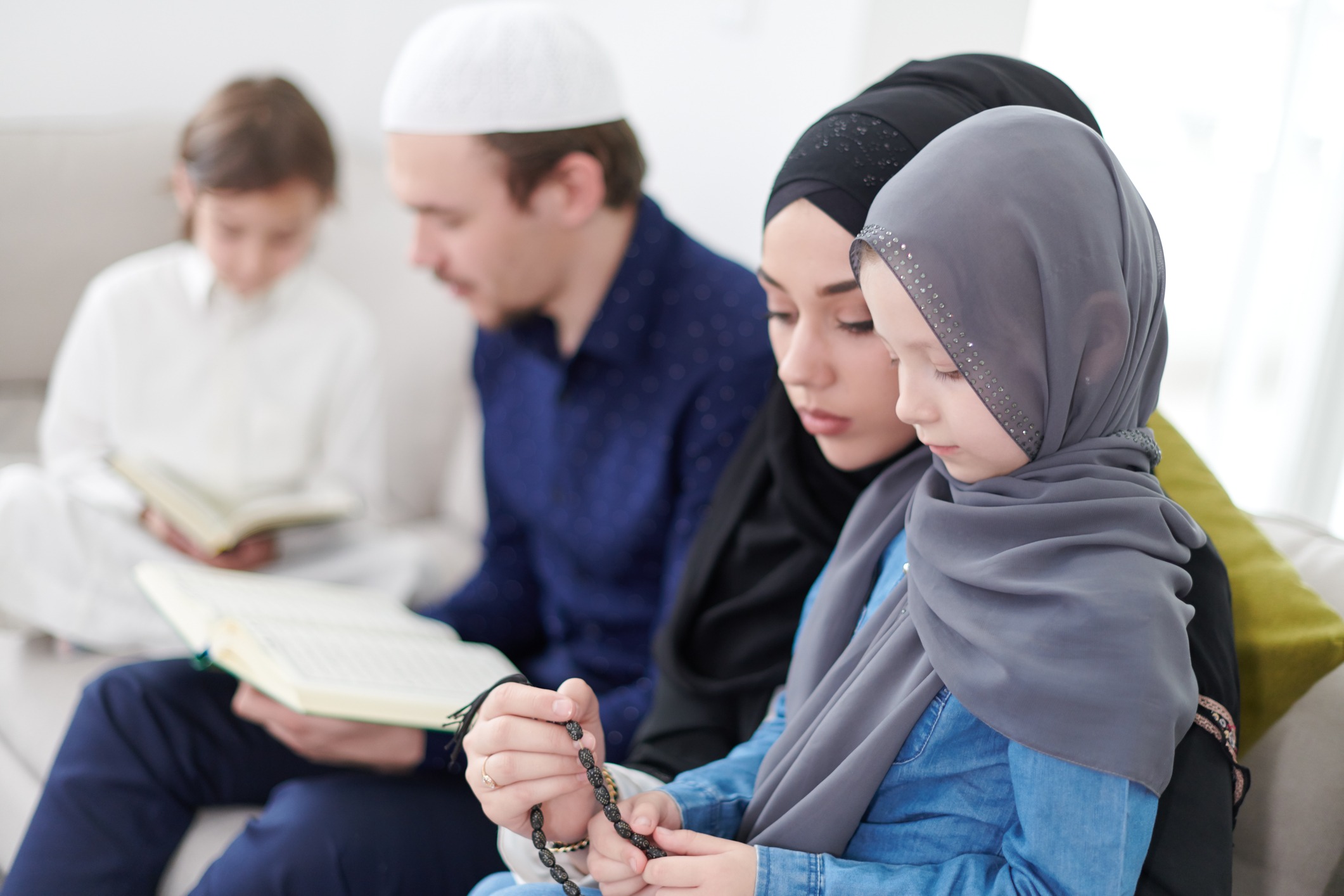De islamitische benadering van ouderschap
Wat is ouderschap?
In een notendop is ouderschap het proces om de fysieke, emotionele, sociale en intellectuele ontwikkeling van een kind van kinderschoenen tot volwassenheid te bevorderen en te ondersteunen.
Als aanhangers van een door Allah geopenbaarde religieuze traditie, de islam, waarderen we het feit dat al deze gebieden van promotie en ondersteuning moeten plaatsvinden binnen het juridische kader van de leer van de Koran en de begeleiding (sunnah) van de profeet Mohammed vrede zij met hem en zijn metgezellen en andere waardige geleerden en personen die hen volgden. Het is niet voldoende om alleen “kinderen te maken” om als een ouder te worden beschouwd of het nu een moeder of vader is. Iedere ouder moet de gelegenheid en de gunst van Allah aangrijpen en ervoor zorgen dat alle aspecten van leven van het kind verzorgd wordt zowel in tijd als ook het spirituele arena dat gekoesterd en onderhouden dient te worden. Uiteraard naar het beste vermogen van de ouders.
“Vereisten” van ouderschap
Er zijn drie belangrijke gebieden die ouders / verzorgers nodig hebben om ervoor te zorgen dat zij voor hen zorgen wanneer zij deze grote verantwoordelijkheid op zich nemen om met hun kinderen samen te werken om hen de best mogelijke mens te maken. Dit zijn eigenlijk fundamentele levensvereisten en het is een noodzaak voor alle mensen om deze te hebben en ervan te ervaren.
1. Fysieke veiligheid en ontwikkeling:
De veiligheid van het lichaam en het leven van een kind.
Het spreekt voor zich dat alle mensen veiligheid en beveiliging nodig hebben, en hiervoor zien we dat landen miljoenen aan geld uitgeven om ervoor te zorgen dat de veiligheid en het welzijn van haar burgers worden gehandhaafd.
2. Intellectuele veiligheid en ontwikkeling:
De omstandigheden waarin de geest van een kind zich kan ontwikkelen.
Het is niet voldoende om ‘fysiek veilig’ te zijn, maar men moet ook intellectuele zekerheid hebben. Ze moeten leven met de wetenschap dat ze de tools krijgen om mentaal te groeien en volwassen te worden en dat ze beschermd zullen worden tegen intellectuele schade en kwaad.
3. Emotionele veiligheid en ontwikkeling:
Om de psyche van een kind te helpen beschermen.
Op het derde niveau moeten kinderen vooral emotionele zekerheid krijgen, zodat ze hun wortels kunnen planten en kunnen uitgroeien tot jonge mannen en vrouwen, terwijl ze emotionele zekerheid krijgen, en dit aspect wordt meestal gevormd terwijl ze thuis zijn, onder de hoede van hun directe familie, uitgebreide familie en vrienden waarmee men dagelijks in aanraking komt.
Voor onze doeleinden denken we na over drie dergelijke leringen en proberen we beter te begrijpen hoe we ze in ons dagelijks leven met onze kinderen kunnen toepassen.
Lering 1
Speel met u kinderen – ALS KIND!
Een belangrijk onderdeel van spelen voor jonge kinderen is om met hun ouders te spelen, en daar moet elke dag wel wat tijd voor zijn. Een speelgoedbedrijf vroeg enkele jaren geleden aan een groot aantal vijfjarigen wat ze graag met Kerstmis wilden, en uit hun onderzoek bleek dat veel kinderen meer tijd met hun ouders wilden hebben!
Het gaat er NIET om hoeveel games of speelgoed u uw kinderen geeft, het gaat er niet om dat u beschikt over het nieuwste videospellen en een 80 ”lcd-tv om op te spelen heeft; het gaat niet om het aantal satellietschotels en duizenden “on demand” kanalen die u uw kinderen geeft, en het gaat ook niet om iets anders waarvan u denkt dat ze het willen en als de hierboven vermelde enquête correct is, dan wilden kinderen gewoon MEER TIJD met hun ouders.
Vaak hebben ouders het te druk met werkverplichtingen, zakenreizen, persoonlijke afspraken en proberen de wereld te redden en hebben ze niet genoeg tijd voor hun kinderen en daarom lieten ze ze babysitten met elektronica. Hierdoor is elektronica een zeer betaalbare manier geworden om met onze kinderen om te gaan, maar onszelf afsnijden of afstand nemen van onze kinderen en hun dagelijkse leven zal in de toekomst zeker voor problemen zorgen. De ouder of ouders die ‘vandaag’ geen tijd heeft voor zijn kinderen, zal merken dat ze morgen, als hun kinderen in de tienerleeftijd zijn, geen tijd hebben voor hun ouders.
Lering 2
Maak uw beloftes waar!
Kinderen leven in hun emoties en als ze iets horen dat hen is beloofd, raken ze erg opgewonden. Ze kunnen zich de belofte voorstellen en deze bij de geest houden op een manier die veel krachtiger is dan we ons kunnen inbeelden. Om deze reden zullen ze nooit vergeten wat u ze belooft! Dus haal het niet in uw hoofd om een belofte te doen die u misschien niet kunt nakomen.
Hoe vaak hebben we als ouders de auto volgeladen om de stad uit te gaan en ergens tijdens onze reis beginnen de kinderen zich te vervelen of onrustig te worden nadat ze zo lang in hun autostoel hebben gezeten. Ze beginnen druk te worden en om ze te kalmeren of ‘stil te houden’, belooft de vader de kinderen een ijsje, frietje of wat speelgoed als ze maar ‘stil zijn’. Maar als de kinderen eenmaal weer gaan lezen of spelen en de kans voor de vader of moeder ontstaat om hun belofte na te komen, gaan ze daar laks mee om en komen ze hun afspraak niet na! In veel gevallen is de enige reden waarom de ouders of verzorgers zo’n valse belofte doen, de kinderen stil te houden en de ouders niet de wens of intentie hebben om hun kant van de afspraak daadwerkelijk na te komen.
Dit is iets dat moet stoppen als de kinderen naar hun ouders kijken als hun enige bron van voorzieningen. Ze begrijpen Allah niet echt “volledig” en dat Hij de Voorziener is of dat het door Hem is dat we zegeningen ontvangen. Ze zien de ouders als hun enige middel om te overleven en als we deze band met hen verbreken en oneerlijk tegenover hen zijn, wie weet wat een dergelijke daad voor hen en hun religieuze ontwikkeling zal betekenen.
Bovendien is het nakomen van iemands belofte vanuit de Koran perspectief een verplichting waarnaar Allah in de Koran vaak verwijst dat een gelovige iemand is die “zijn belofte nakomt” en dat hij op de opstandingsdag zal worden ondervraagd over beloften die hij maakte maar zich daar niet hield. Dus niet alleen zal dit van invloed zijn op de eigen spirituele niveau van een ouder, maar het zal ook de perceptie van de kinderen over de ouders en uiteindelijk onze mooie religie de Islam beïnvloeden.
Lering 3
Leer uw kinderen de essentie van geloof!
Als u uw geloof leert kennen en leert hoe u het op de juiste manier hoort te aanbidden, zoals dat overgeleverd is door de profeet Mohammed vrede zij met hem en dan vooral de rituelen en tradities, bespreek dan met uw partner wat voor u van bijzonder belang is. Bedenk dat uw jongere kinderen niet veel theologische concepten zullen begrijpen van het geloof, maar zij zullen hun geloof ontwikkelen door middel van woorden en acties en gesprekken met u en uw partner.
Het is van vitaal belang dat we onze kinderen zo snel mogelijk correcte islamitische leringen bijbrengen, zelfs voordat ze ter wereld komen als de moeder zwanger is; de ‘eerste’ islamitische les van onze kinderen zou echter moeten zijn wanneer het kind ter wereld komt, de trotse ouder de Adhan reciteert in het rechteroor van het kind. Helaas worden de leringen van het geloof vanaf deze dag overgelaten aan de “gemeenschapsleiders”, de imams of anderen, omdat de ouders het te druk hebben of niet over de vereiste kennis beschikken om zelfs de fundamentele basis aan hun kinderen te leren – en dit is een zaak dat direct moet stoppen.
Toegegeven hebben dat moslimouders misschien geen religieuze autoriteiten van het geloof zijn, dienen ze genoeg basiskennis islam te hebben om hun kinderen te onderwijzen en om ze op het juiste leer pad te krijgen en dieper in de islamitische kennis willen duiken. Nieuwsgierigheid dient continue gevoed te worden met islamitische uitleg en benaderingen.
Voor velen zal dit niet worden gedaan door middel van islamitische kennis uit boeken, lessen of lezingen. Maar gewoon door dagelijks “de islam te leven en te beleven”. Ouders kunnen heel veel doen om de religie te leven en te beleven en zo te werken aan de islamitische identiteit van het kind. Bijvoorbeeld voor zorgen dat de kinderen op de hoogte worden gebracht van gebedstijden door middel van een Adhan wekker of computer of applicatiesoftware of de vader die de Adhan verricht; ervoor zorgen dat de kinderen wudu leren en verrichten of op zijn minst de handelingen doorlopen en vervolgens worden aangemoedigd om regelmatig het gebed te verrichten en het liefst thuis in gemeenschap, de kinderen helpen bij het reciteren van de Koran en verschillende smeekbeden te leren, de kinderen op Umrah te nemen, enz.. Deze voorbeelden zullen het kind zeker verder brengen om hen verder kennis te laten maken met de enige ware religie de islam. dit zijn allemaal eenvoudige manieren waarop het islamitische gezin samen kan groeien in de islam en onthoud dat “het gezin dat samen het gebed verricht, bij elkaar blijft.”
We sluiten af met een strenge waarschuwing waarbij alle vaders en moeders zeer zorgvuldig moeten nadenken over hun rol als ouders en voogden van kinderen.
Als mensen en moslims met gezond verstand weten we dat onze samenleving uiterst complex is en dat regeringen dag in en dag uit wetten maken en aannemen en delen van het systeem zodanig veranderen dat het soms onmogelijk is om bij te blijven. Weet dan dat de regering heel goed weet dat de massa (nadruk op ouders) niet genoeg tijd heeft om deze voortdurend veranderingen te herzien voor de opvoeding of leiding van het gezin. Hierdoor is het intellect van de massa’s ten prooi gevallen door alle bureaucratie, maar die dingen die we kunnen doen om onze kinderen in deze wereld te helpen en ze een voorsprong te geven voor het welslagen in het hiernamaals, zijn dingen waar we rekening mee moeten houden om ze te leren.
Er zijn veel levensvaardigheden en gezonde denkwijzen die niet worden onderwezen in het openbare schoolsysteem; er zijn nog zoveel meer zaken die we aan onze kinderen moeten meegeven, wanneer u als ouder dit niet meegeeft zal de televisie en muziekindustrie de verkeerde levensvaardigheden meegeven.
Hoogstwaarschijnlijk zullen ze allereerst naar hun vrienden of niet islamitische instellingen gaan waarvan sommigen misschien niet het juiste islamitische morele systeem hebben en hen misschien dingen leren, maar niet noodzakelijk iets waar we graag mee bezig zijn als moslims. Dit kan dan weer uiteindelijk resulteren in de spirituele vernietiging van de ziel. Daarom moeten we ervoor zorgen dat we ons best doen om onze kinderen te leren over de wereld waarin we leven vanuit een islamitische bril en hoe we door het systeem en de opzettelijk ontworpen valkuilen kunnen manoeuvreren. Op de geschikte momenten moeten we onze kinderen de basis van het economisch beleid leren, bankspecificaties en verzekeringen, zodat we ze kunnen voorbereiden op het begrijpen van zaken die ze nodig hebben als ze er alleen voor staan; we moeten met hen praten over de belastingwetten, enz … en samengevat, alle dingen die we in ons leven hebben gebruikt en die we dagelijks nog steeds nodig hebben, zodat ze nooit in het moeras terechtkomen of proberen te zwem door het juridische jargon van het leven.
Toegegeven dat de zaken veranderen van onze huidige generatie naar de volgende generatie en dat wat vandaag de dag geldt misschien morgen niet hetzelfde is voor onze kinderen. Maar we kunnen ons best doen en onze verplichting als moslim ouder en verzorger om onze kinderen een rugzak mee te geven met de islamitische ethieken, regels, voorwaarden, normen en waarden, denkwijzen en levensstijl. Dit moet dan hun fundament zijn om verder intellectueel en spiritueel te groeien in dit tijdelijke beproefde leven. Vergeet niet beste moslim ouder en verzorger, het is Allah de Meest Verhevene die u uitgekozen en begunstig heeft om de volgende generatie op te voeden volgens de religie die Hij uitgekozen heeft namelijk de Islam. Allah zegt in de Koran in (surah al-Maa’idah: ayat 3)(interpretatie van de betekenis):
“Vandaag heb ik jullie godsdienst voor jullie vervolmaakt en heb ik Mijn gunst voor jullie volledig gemaakt en heb ik de Islam voor jullie als godsdienst gekozen”
In dit vers, dat geopenbaard is tijdens de afscheidsbedevaart van de Profeet (vrede zij met hem), verkondigt Allah, de Verhevene, dat Hij dit geloof van ons heeft voltooid en daarmee ook een eind heeft gemaakt aan de reeks opeenvolgende Profeten. Ook geeft Hij te kennen dat Hij tevreden en voldaan is met de Islam als geloof voor Zijn dienaren.
Wij vragen Allah de Meest Verhevene om ons allen te helpen en te leiden in deze tijdelijke beproefde levensreis. Ameen!





